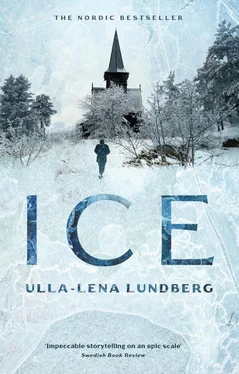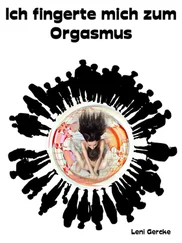Several people have mentioned how important the church is to them when the weather’s bad and it’s hard to see. Even though they know the right heading and know where they are, when the church appears on the top of its rocky knoll it’s still a reassurance that they’re headed right and will make it home this time too.
“Can you explain it?” they say. “When we come to church it seems like she sits in a hollow, but when we’re out at sea, we see her up on a hill, as if she were keeping watch. It’s like a miracle. She stands up on the hill and looks for us, and when we come up from our boats on Sunday she stands down by the churchyard and welcomes us.”
“Like the Holy Mother of God, as we’d say if we were Catholics,” he says. “It’s a beautiful thought.”
“It’s not a thought, it’s the way it is,” the old verger says. He’s hurrying after the others, who are on their way to their boats, moving faster than they do in summer. They’ll eat and rest and be ready to go out with their nets as soon as the Sabbath is over at six o’clock.
The summer has turned on its heel. The sailboats are sparse in the bay, and one day the last of them has gone. The guests at the parsonage have thinned out too, and soon they’ll be alone in the house. She and he and Sanna, who’s run wild and been spoiled by all the attention. “Now we’ll need to tighten the reins a bit,” says Mona, “and pull her back into shape.”
STILL AUGUST AT ITS MOST BEAUTIFUL, but the evenings are dark and there is a cold breeze. The parish around them is very hard at work, and days go by without anyone setting a foot through the parsonage door. It’s quiet at the store and the post office. There is time for heartfelt conversations with Adele Bergman and Julanda at the post office, well-informed and full of goodwill. She knows a lot because she asks questions—for example, if they won’t soon be expecting a little one at the parsonage—and she gets him to lay out his Åland family tree back to Adam. In return, she tells him how the fishing is going: not too bad, though the fisherman has never been born who would admit that it’s going well. By the middle of September, they should have taken what they need, so they’ll have time to salt down their herring and get ready for the autumn market.
The organist has a farm and his organist’s salary, so he isn’t dependent on the herring catch the way the fishermen are, but he fishes by tradition and so that his boys can earn a little money of their own. He comes rushing to church on Sunday mornings without having rehearsed, his fingers stiff with cold, and doesn’t play as well as he does in the spring and summer; this too is a tradition. The congregation yawn and sleep discreetly during the sermon, an indulgence no one begrudges them. Then they fly away in their boats, and the verger is left in the church, pottering about and chatting with the priest, who basks in the peace and quiet like a cat. Young man that he is, surely the rush and bustle of the summer has not worn him out? Of course not, but this calm is now a welcome part of existence. Perhaps he’s become too materialistic, he tells the verger, and it’s high time he thought about the spiritual side of his work.
But as soon as he says this, he starts laughing and has a story to tell the verger, whose cow grazes on the other side of the narrow inlet separating Church Isle from the main island. “Early this morning I was sitting in the sacristy thinking about my sermon. The light wasn’t good, and suddenly it got even darker. I thought the sun must have gone behind a cloud and I looked up at the window. And there I saw a large, dark, unmoving face with big eyes staring straight at me. I was as frightened as a child, and all sorts of thoughts went through my head. I thought of the devil, though I’ve never imagined him so substantial, and the expression ‘God sees you’ occurred to me, though I’d never pictured God looking like that either. Staring, dark. Myself, I just stared back, without moving a hair, and then I blinked and looked again. Do you know what it was? It was Gertrude, with her dark face, who’d swum across to Church Isle and now stood there staring in at me through the sacristy window. Probably as terrified as I was, and just as incapable of understanding what she saw.”
They both laugh, but the verger is uneasy that his cow has invaded the parsonage’s pasture. “She’s a dickens of a cow for wandering off,” he says. “We’ve run the fence clear out into the water, but she swims around it, the old devil. I assume Mona sent her packing.”
She had indeed. Armed with a big alder switch, she came dashing up and drove the blasted cow back across the island and out into the water. As if it wasn’t enough that she had to keep an eye on the tenant farmer’s animals, now she’s also got the verger’s cow to watch. There is nothing to eat on the verger’s land, grazed bare, so of course she swims over. And the tenant’s cows stretch the barbed wire till it breaks in order to get at some grass, but that’s no reason for the pastor’s cows to suffer. They’ve both been properly covered and can now graze on the meadow where fresh growth has exceeded expectations because they cut their hay so early and the dew has been rich and also the evening mist.
It’s as if they were closer to the primitive forces of nature out here, and Petter observes that they work in harmony with the primitive forces in Mona, who has acclimatized astonishingly well. If he asks her if she likes it here, she snorts and says she doesn’t have time to think about it. She has so much to do, and when you’ve got a lot to do, you’re happy!
Sanna is one and a half years old in September and has started to talk like a grownup. Petter falls head over heels in love. “She says ‘summer people’, she says ‘salt herring’. Isn’t that fantastic?” he says. He can’t get enough of his daughter, who acts silly and writhes with delight, and Mona gets angry. “Such nonsense!” she says. “Don’t encourage her! She has to get it through her head she’s not the queen of the castle.”
She lifts Sanna from her Papa’s arms and Sanna screams and cries because Mama is mad. “Shame on you!” Mama says. “What a way to act! Now you can just sit in the bedroom till you can be good!” She whisks her off and puts her down in her crib with a careful thud. “No one feels sorry for you!” she says. “The way you carry on. Now you can sit here and calm down.”
She closes the door and goes back to Petter, who looks sheepish and unhappy. Poor Sanna! She wails in despair. Why shouldn’t she be queen of the castle now and then? But he doesn’t dare say so to Mona, who is absolutely convinced that children should be kept on a short leash and not allowed to believe that they were put on earth to be courted and indulged. Discipline hurts, but it’s necessary if the child is not to become a pest. Sanna has been spoiled by all the summer guests and given an altogether exaggerated sense of her own importance. They have to take that out of her.
Mona gives her husband a piercing look. “It’s high time she had a little brother or sister, so she’s not ruling the roost alone!”
They’ve talked about it before and considered and planned. The best time for a new baby would be after the haymaking, when the worst of the work has been done and it’s still summer and warm. The end of July, to be exact. She counts on her fingers. “Middle of October. We can start then.”
She makes it sound like one more job, but she looks bashful and turns away, puts her hands to her face and smiles between her fingers. He’s up from his chair and takes her in his arms. She writhes like Sanna. “Not yet! First two weeks of pastoral work till late at night.”
Читать дальше












